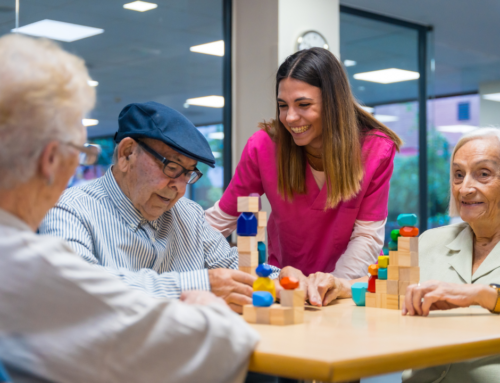Share This Story!
Do Nutrition Recommendations Change As You Age?
Most people benefit from more fruits and vegetables and less processed foods. But as people age, nutrition recommendations can get more nuanced. Here are five tips for healthier eating in senior living.
Tip 1: Choose spices over salt
One of the most important ways to improve heart health is to cut back on sodium. Too much sodium leads to high blood pressure, which is a major risk factor for heart disease. Recent studies have shown that seniors are more sensitive to sodium and have a higher risk of heart attack, heart failure, and stroke.
Pre-packaged foods are a huge culprit of excess sodium. Additionally, seniors are advised to season foods with herbs and spices and avoid seasoning with salt. As people age, the goal should be to keep daily sodium intake under 2,300 milligrams, with a stretch goal of fewer than 1,500 milligrams.
Tip 2: Cut corners with pre-chopped fruits and veggies
Research has shown that a diet rich in fruits and vegetables lowers the risk of heart disease, diabetes, stroke, and even some types of cancer. In fact, people who ate 8 or more daily servings of fruits and vegetables had a 30% lower chance or heart attack or stroke.
Sometimes elderly people have a harder time getting around in the kitchen or chopping fruits and vegetables. One tip is to look for pre-chopped fresh vegetables and fruits. Seniors could also consider buying frozen fruit to add to smoothies, oatmeal, or yogurt.
Tip 3: Eat more of this for better heart and digestive health
Studies have shown that eating 2-3 servings of whole grains per day can reduce the risk of heart disease by 20-30%. Whole grains are also important for digestive health and meeting daily fiber intake. In adults over the age of 50, men should aim for 30 grams of fiber per day and women should aim for at least 21.
Tip 4: What you eat can help your bones
As people get older, bone tissue starts to break down faster than it rebuilds. This can lead to weakening bones and possibly to osteoporosis. One of the most important ways to offset bone weakening is to get enough calcium and vitamin D.
Calcium can be found in milk products, dark leafy greens, or supplements. Vitamin D can come from sunshine, milk, eggs, fatty fish, and fortified cereals. Seniors should focus on getting at least 1,200 milligrams per day of calcium and at least 800 IU of vitamin D. These recommendations may be higher based on the individual.
Tip 5: This nutrient can prevent depression
As people age, the body has a more difficult time absorbing vitamin B12. But B12 is extremely important in seniors. In fact, B12 deficiency has been linked to higher rates of depression, dementia, and mental impairments in the elderly.
Experts recommend that seniors talk to a doctor about B12 supplementation and aim to eat foods high in B12, like shellfish and eggs. Because the signs of B12 deficiency can be mistaken for signs of aging, seniors and caregivers should be proactive about asking a doctor to test B12 levels.
The best years are still ahead
The senior years can be the best in a person’s life. Choosing healthy nutrition makes senior living easier and happier. Talk to a healthcare professional for individual nutrition advice as well as recommendations for any supplementation.





